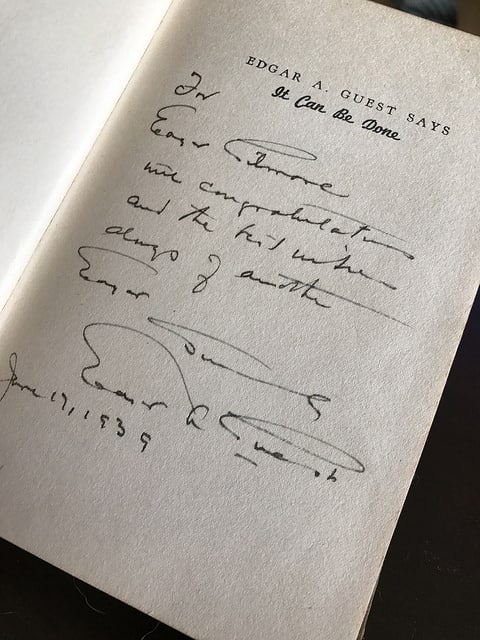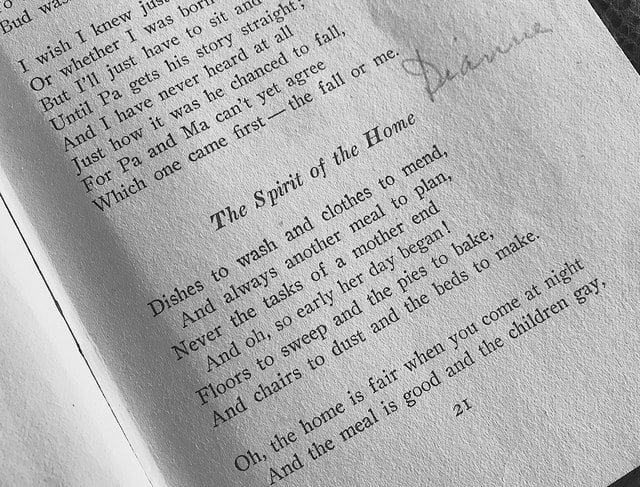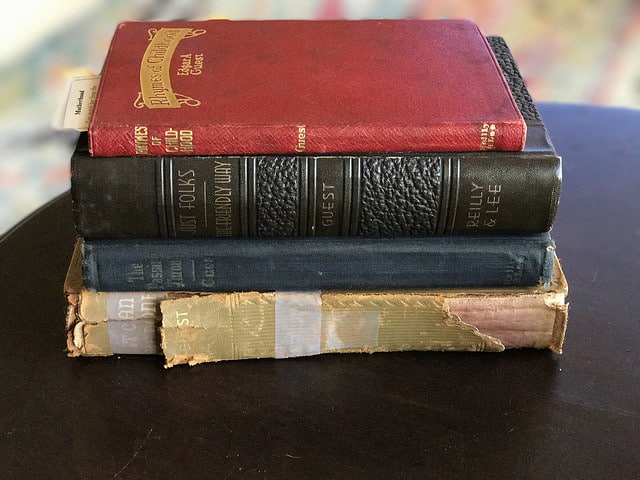For Edgar Gilmore with congratulations
and the best wishes always of another Edgar.
Sincerely,
Edgar A. Guest
June 17, 1939

He didn’t know. My Aunt Esther, Dad’s sister, married a Gilmore. But we knew him as Uncle Bob. Could it have been Uncle Bob’s dad?
I found three other books by Guest in a box of stuff we inherited from my in-laws.
Just Folks – The Friendly Way (copyright 1917)
The Passing Throng (copyright 1923)
Rhymes of Childhood (copyright 1924)
I called my sister-in-law to ask what the inscription in Rhymes of Childhood meant.
To a speedy recovery
Keith, Lillian, and Dianne
3-14-41
Dianne didn’t know. She would have only been a year old. She did tell me Grandma King was a big Guest fan. This book was obviously one that she passed on for whatever reason since she’d glued her own nameplate sticker on the front endpaper.
She also didn’t know when or why her mother had been penciled Dianne’s name next to a poem titled, “The Spirit of the Home” in The Passing Throng. The third verse was bracketed in pencil.
Home, you say, when the day is done,
Home to comfort and peace and rest;
Home, where the children roam and run—
There is the place that you love the best!
Yet what would the home be like if you
Had all of its endless tasks to do?

It’s likely that a lot of moms and dads marked up verses in Guest’s books. He wrote verses about everyday life that many could identify with.
Edgar Allen Guest was born August 20, 1881, in Birmingham, England. When he was about ten years old, the family moved to Detroit, Michigan——Wayne County, where I was born and spent my early years. Of course, it’s the largest county in Michigan, so I doubt the cousins and I would have run into him at Yankee’s corner store when we went down for candy.
The Detroit Free Press hired Guest as a part-time copy boy when he was about fourteen. When his dad died three years later, he dropped out of school and went to work full-time. He worked his way up to police beat reporter and then exchange editor—culling snippets from other publications. One day, instead of clipping a verse to print, he dared to write his own folksy poem and submit it to the Sunday editor. The paper published it on December 11, 1898, in their column titled Chaff. Guest was 17 years old. Eventually he had his own weekly column called Blue Monday and then a daily Breakfast Table Chat that was syndicated in over 300 newspapers and reached millions of people.
Guest and his brother Harry bought a case of type and self-printed 800 copies of Home Rhymes in 1909—the year my father-in-law was born. They printed Just Glad Things in 1911—the year my mother-in-law was born. Then Reilly and Britton began to publish Guest’s books at the rate of about one a year. All in all, he authored over 20 volumes of poetry and at least 11,000 poems. It Can Be Done is a collection of inspirational stories. The introduction describes how Guest took the train—always the same train—from Detroit to Chicago to rehearse (eight to ten hours) for his live half-hour weekly NBC radio broadcast, It Can Be Done. He kept that schedule for 11 years, from 1931-1942. In 1951, NBC televised a series called A Guest in Your Home.

Although Michigan contributed two United States Poet Laureates—Philip Levine and Robert Hayden (the first non-white poet to serve), Michigan is one of five states currently without its own poet laureate. In fact, Guest was the first and only. Two different bills introduced since 2005 to establish the position seem to have stalled. In the meantime, the Upper Peninsula and cities in the Lower Peninsula like Grand Rapids and Lansing, recognizing the unique contributions of poetry, have established their own poet laureates.
Still wondering about Edgar Gilmore, I visited Ancestry.com to do a little sleuthing. It turns out my Aunt Esther got married to not Bob Gilmore but to Edgar Gilmore in 1942. I’ll never know why we called him Uncle Bob. There’s still the mystery of the inscription date, June 17, 1939. My uncle was born in 1922, so in 1939 he would have been 17, the same age Edgar Guest was when he dropped out of school to work full-time. Maybe Guest, the high school dropout, gave the commencement address at Uncle Bob’s high school that year. Maybe he also passed out copies of his book and then autographed them.
I’ll probably never know any of that for sure—but the book might still make a great graduation gift even today.
Read More About “Eddie” Guest
Speaking in Tongues by Robert Pinsky for Slate
From the Michigan Library Bulletin
From Representative Poetry Online
And a bit of trivia for you
Robert Redford’s directorial debut was for the movie Ordinary People in 1980. It starred Mary Tyler More, Judd Hirsch, Timothy Hutton, and Donald Sutherland, and was nominated for six Academy Awards. It won four of them as well as five Golden Globe awards. The movie was based on the 1976 novel written by Judith Guest—Eddie’s great-niece.
Edgar Guest recites two poems—“Gone Fishing” and “The Junk Box”
Not to be outdone, Sandra continues her Commit Poetry journey, reciting Guest’s “It Can Be Done”
Featured photo by Anil Kumar, Creative Commons license via Flickr. Post and photos by Sandra Heska King.
- 50 States of Generosity: Iowa - April 7, 2025
- 50 States of Generosity: Montana - January 27, 2025
- 50 States of Generosity: Idaho - December 16, 2024

L.L. Barkat says
What a marvelously fascinating post, Sandra! I love all the twists and turns of history and family.
Oh, and that handwriting in the book! Truly a piece of art.
Sandra Heska King says
Thanks so much, L.L. I’m still kind of astonished that Michigan has no Poet Laureate. What could be more pressing than poetry?
Sharon A Gibbs says
“The third verse was bracketed in pencil.” I love old books, history, and imaginings of parts unknown.
Memorizing a poem could have been more enjoyable (for Dianne) than writing “I will clean my room” one hundred times.
Thanks for sharing this story.
Sandra Heska King says
“Memorizing a poem could have been more enjoyable (for Dianne) than writing “I will clean my room” one hundred times.” That made me laugh out loud!
And yes… I had to take a triple take when I opened to that inscription. 🙂
Katie says
Sandra,
Thank you for committing poetry again! Enjoyed your recitation of
“It Can Be Done.” 🙂 That is a motivating and inspirational poem.
After reading your post I played around with a couple of ideas and this is what I came up with:
I had guessed that
he was a Guest;
but he said that
he was a newspaperman.
So, I pointed out politely
that he wrote verses.
Which, he did not deny,
but instead quoted line-by-line.
Then I asked had
he not published books.
This he did not deny either
but told me their very titles.
So then, I queried him
whether he was also laureate
Whereupon he let me know
our conversation was done.
(just sort of a silly imagining of a conversation with Edgar Guest)
Hope you enjoy:)
Sandra Heska King says
“I had guessed that he was a Guest”
My favorite line. Thanks so much, Katie. I *did* enjoy. 🙂
Bethany R. says
When I read your writing, I love how natural it feels to follow you in your wonderings and explorations. You are such a fun friend to the reader. Thanks for the wonderful post. 🙂
Virginia Mohler says
Hello Sandra. My name is Virginia Mohler. In 1992 I found a book by Edgar Guest, When Day is Done, at a local thrift store called The Jr League Thrift Store. Inside on the front binding is a poem taped to the book. It is a poem to three sisters at the time of their Mothers death. Their names are Margaret, Katherine & Regina. It is signed simply Daddy.
I took it to a handwriting expert who signed a letter that it is Edgar Guest own handwriting.
I have had this all these years. I am fascinated by it and curious about who they are, who is DADDY? Did rewrite it for a friend? These are my questions as I know his story, his wife and children’s names.
I came across your place here and decided to reach out. I need to seek out a market to sell it yet I want to find the original owner. It is very interesting when one has it in front of them.
Can you give me any suggestions on how to move forward with this? It is in pencil dated 1924 & fading. Blessings be on you
Virginia Mohler
Sandra Heska King says
Hi, Virginia. Thanks for stopping by! Did the handwriting expert say the poem was written and signed “Daddy” by Edgar Guest? Wow. What a fascinating story and mystery to solve. I’m sorry I don’t have a clue as how to proceed. It may forever be a mystery. 🙂
Virginia Mohler says
I acquired a sample of Mr Guest handwriting from his library. She used that for comparison. I talked to his daughter in law, I think Betty in the mid 90’s. She was appalled at the thought of the DADDY part and would not continue the conversation. As it was signed Daddy.
He never said the name of the Mother who passed just that she was the GREATEST LOVE OF A LIFETIME and that she was buried in a prairy in TX. He only named the three girls.
Someone gave the book to Margaret at the time of her graduation. I do not know who taped the poem inside the book. A mystery for me for 26 years.
It is an amazing piece of work that I do need to find out about before it fades.
Thank you so much
Virginia Mohler